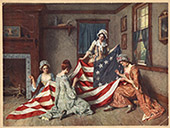Libraries, University of Nebraska-Lincoln
Document Type
Archival Material
Date of this Version
1762
Citation
Anthony Benezet. A short account of that part of Africa inhabited by the Negroes … (Philadelphia, 1762).[2024 reprint]
doi: 10.32873/unl.dc.zea.1507
Abstract
Anthony Benezet scoured the available English literature of colonial exploitation for evidence of the humanity of the trafficked Africans and the inhumanity of the European traders in human beings. He compiled and published this Short Account in 1762 to present the case for termination of the trans-Atlantic transportation of kidnapped Africans, for abolition of slavery and the slave trade, and for emancipation of the enslaved persons held in bondage in North America and elsewhere. Drawing on Scottish moral philosophy, British Whig ideology, and, most importantly, on New Testament gospel teachings, Benezet presented both reasoned and impassioned appeals for the recognition that Africans had rights to life and liberty that were being abrogated on an industrial scale in violation of the most sacred Christian beliefs.
Benezet (1713–1784) was a refugee from France by way of England whose family had relocated to Philadelphia in 1731. He became a schoolteacher who founded the first public school for girls in America in 1755 and the Negro School at Philadelphia for black children in 1770. Benezet was an active member of the Quaker meetings and had previously authored a short pamplet (1760) and an epistle to congregations (1754) against the participation of Quakers and other Christians in “the man-trade.” This Short Account in 1762 was a more ambitious work, combining anti-slavery arguments with historical and sociological information about Africa and its ongoing exploitation. Informed by wide reading, particularly the serialized A New General Collection of Voyages and Travels (London, 1745-1747), known as Astley’s Collecctions, Benezet turned the literature of exploration and conquest into an argument for the common humanity of Africans. He found evidence that they were settled, cultured, independent, and largely peaceable; he contradicted the prevalent notion that enslaved transportees were prisoners of war who would otherwise have been executed; and he exposed the centuries-old efforts of English, French, Dutch, and Portuguese merchant enterprises to profit from buying and selling Negro men, women, and children. The mid-eighteenth century witnessed the height of the English and North American participation in the trans-Atlantic slave trade, and this early abolitionist tract raised an important and ultimately influential outcry in favor of its termination and the remediation of its manifold abuses.



Comments
Text is public domain; notes are distributed CC-BY